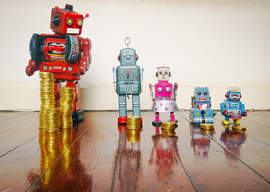
March 09, 2018

Source: Bigstock
For, regardless of age, gender, race, or class, there is in human beings an unconscious need to venerate someone or something. Different people realize it through different forms. For some, it’s a picture or an autograph. For others, it’s small talk with an eminent or famous person, to be related to others time and again. The essential thing is that the idolaters shall have idols.
This need, to be sure, is different from our quite reasonable regard for supreme merit, though the two are often connected. So, for instance, often what begins as deserved appreciation culminates in idolatry (certainly far more affective than intellectual), but because the latter is offensive to pride, one may be unwilling to recognize this phenomenon. Here the pretense to equality is fascinating. People can slavishly venerate someone, and so render themselves inferior to him in respect to whatever makes him so significant, all while acting as if they are nevertheless his equal. Now, how is it, you may ask, that they are not bothered by the contradiction? The answer is that their minds are superficial, and their ideas only partially formed, so they are never even aware of it.
Much of the gossip people engage in reveals how unequal they believe they really are, though this may be an unconscious belief. People will go on and on about how wonderful a person is, and though they do not think so highly of themselves, they will still say everybody is equal. And there are times when, despite having partaken in vicious gossip, people still betray feelings of inferiority, motivated as they are by resentment. For example, wherever there is a person who excels at something, and who is therefore superior to many in this respect, there will be resenters who insist he is all hype, overrated, or owes his achievement to external advantages, and so on. Or again, people will say he is arrogant, or that he is insecure and thus endeavoring to show them up. It is all quite comical, because with these condemnations what they are really doing is diverting themselves from their real problem: the painful awareness of their inferiority, as evidenced by their gnawing envy.
“If mankind had wished for what is right,” said William Hazlitt, “they might have had it long ago.” So it is with equality. Though people feel profound sympathy for the poor, they also want to seem better than others. A person who is exceptional at something does not want to be anyone’s equal; rather, the best. And no wonder. There is an intoxicating delight in superiority, which emerges from the awareness of how we believe others perceive us.
This intractable aspect of human psychology Marxists and other utopians never seem to have considered. Though most of us have moments in which we want life to be better for everyone—for no one to go hungry, to be homeless, to be without health care, and so on—it is also true that many people get an immense psychological satisfaction from being more affluent than others, from the appearance of superior rank. Hence the celebrity’s $800 Versace sweatpants, so much more expensive than the $8 pair from Walmart. Like belonging to a country club or having an Ivy League degree, the value consists of symbolic comparative superiority, which is impossible to measure, and hardly reducible to any name or figure; for it is a matter of individual pride, boundless and irrational.
It is easy to see that this tremendous pride, or narcissism, is always at least a latent force in human affairs, ready to be called forth by the right pretext. So it frequently happens that when a person rises in social status, he immediately begins to carry himself in a different manner, one meant to be suggestive of his newfound station. It is plain from this that human nature itself is strongly inclined to such behavior, which needs only the right occasion for this very pleasurable feeling to come forth.